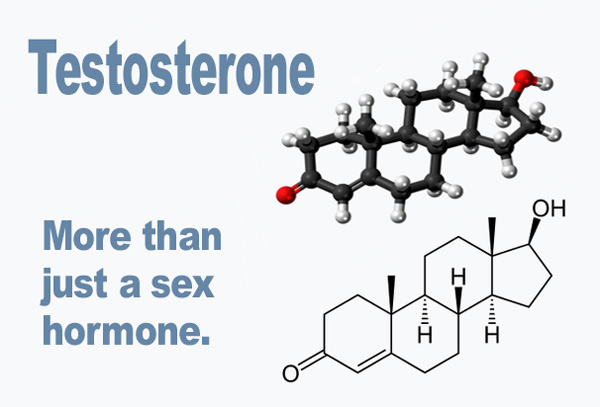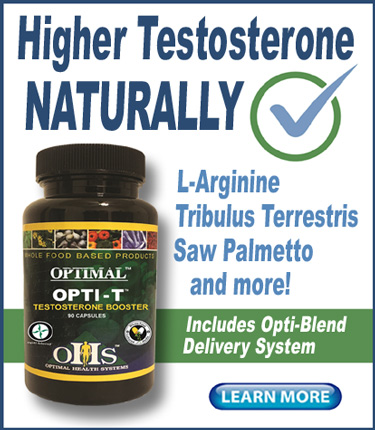Testosterone is the primary male sex hormone and anabolic steriod.
Testosterone is also produced by females; however, average levels of testosterone in adult males are about seven to eight times as great as in adult females. For this reason it typically thought of as primarily a male hormone.
Testosterone is biosynthesized in several steps from cholesterol. It is a precursor hormone that relies on fat to form.
Testosterone needed for overall health
Testosterone is secreted primarily by the tesitcles of males, but has many functions besides its well-known sexual and reproduction tasks.
Testosterone supports healthy bone density and oxygen-carrying capacity; it builds muscles and mobilizes fat for energy; and supports the brain and enhances memory.
The higher the level of testosterone in a man’s body the less it is prone to muscular fatigue when doing workouts or physical work.
Testosterone has an inverse relationship between testosterone levels and cardiac risk. The higher the levels, the lower the risk of heart disease, as testosterone has a dilating effect on coronary arteries which supply the heart with blood.
The optimal level of testosterone in the male body is 800 ng (nanograms)/dl/deciliter in blood. Ascertaining testosterone levels requires lab work, though there are a number indicators—such as low energy and sex drive—that can be the first early warnings.
Preserving optimal testosterone levels can be a challenge in our modern stressful, chemical-filled world.
Stress—enemy of testosterone
Testosterone production lowers as men age, starting about age 30. Stress–including physical, mental and emotional–can also lower testosterone production.
Excessive stress causes too much production of cortisol. Cortisol is the big enemy of testosterone production, as it promotes storage of fat in the body. Fat is, in fact, the very ‘fuel’ that is needed to make testosterone—but it needs to be burned off, not stored.
High-stress but sedentary modern jobs are one of the biggest enemies of testosterone production.
The Standard American Diet of fast and processed foods is another problem. Moreover, science is yet to determine just how much pollutants, pesticides and GMO foods affect testosterone production.
A number of studies have established a decline in testosterone levels in western countries. It is likely all of the above factors are contributing to this decline.
In addition to avoiding stress, there are three main avenues for promoting optimal testosterone: Diet, exercise and supplements.
Expert advice on the best testosterone-building foods vary greatly. We reviewed several popular nutrition and body-building websites, and found general agreement of the following foods:
Potatoes, macadamia and Brazil nuts, extra-virgin olive oil, parsley, ginger, eggs, coconut oil, onions, garlic with Vitamin C combined, grass-fed beef and butter, venison, elk, pomegranate, avocado, raw cacao and raw honey.
Other testosterone-producing foods include cabbage (and other cruciferous vegetables to flush out female hormones), tuna, berries and most seeds
It should be noted that a meat-free diet lowers testosterone levels by an average of 14 percent, so vegetarians, especially, should be vigilant with testosterone-building supplements.
For supplement help in building testosterone, consider the amino acid/herbal blend found in Optimal Opti-T by Optimal Health Systems. It includes L-arginine, Tribulus Terrestris, Saw Pametto, Pygeum Africanum and other testosterone enhancers.
– – –
Sources include: ReadyNutrition.com, MensHealth.co.uk, Wikipedia.


